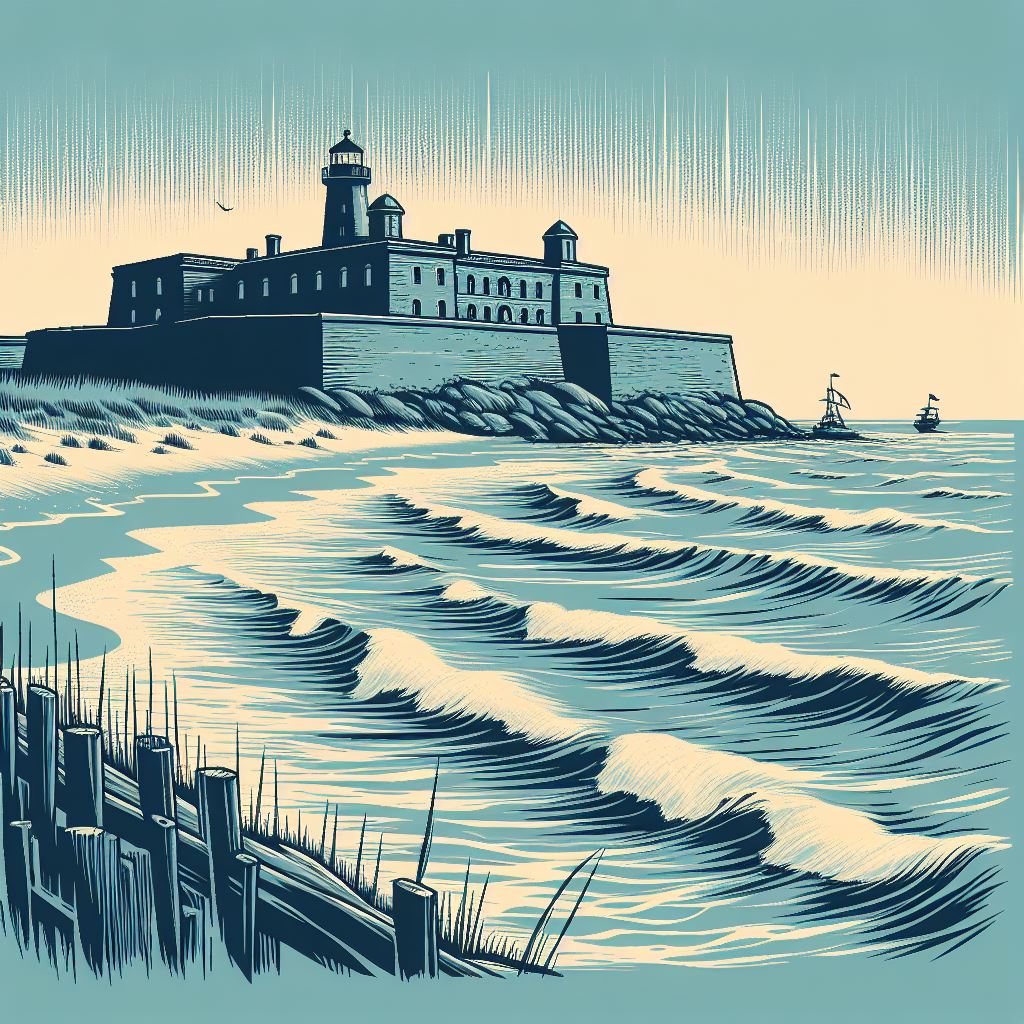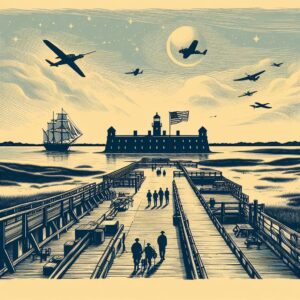Fort Macon State Park Unveiled: 10 Secrets and Surprises in Coastal Carolina
Introduction
Welcome to Fort Macon State Park’s coastal haven of history, nature, and excitement! Nestled on the shores of North Carolina, this enchanting destination is more than just a park; it’s a time capsule waiting to be explored. Picture this: a historic fort surrounded by pristine beaches, nature trails that lead to panoramic views, and a sense of adventure lingering in the salt-kissed air.
As we embark on this journey through Fort Macon, prepare to be captivated by tales from the past, intrigued by the diverse ecosystems that call this place home, and inspired to create your own memories in this coastal paradise. Imagine walking the same grounds where soldiers once stood, defending the coastline during the Civil War, or strolling along sun-kissed beaches with the Atlantic Ocean as your backdrop.
In this blog, we’ll unravel the layers of Fort Macon State Park, delving into its rich history, the natural wonders that surround it, and the myriad activities that promise an unforgettable experience. Whether you’re a history buff, a nature enthusiast, or someone seeking a serene escape by the sea, Fort Macon has something special for everyone.
Join us as we peel back the layers of time and nature, unveiling the secrets that make Fort Macon State Park a coastal gem. From the sun-drenched beaches to the echoes of history within the fort’s walls, every step promises a new discovery. So, grab your virtual explorer’s hat, and let’s embark on a journey through the sands of time and the beauty of coastal Carolina. Fort Macon awaits – are you ready to dive in?
Attractions In Fort Macon State Park:
The leading 25 attractions within Fort Macon State Park are displayed in the table below, highlighting distinctive features that distinguish each site and render it remarkable.
| # | Attraction | What’s Special |
|---|---|---|
| 1 | Fort Macon State Park and Preserve | Historic fort, pristine beaches, and coastal wildlife. |
| 2 | Beaufort Historic Site | Preserved historic buildings and maritime history. |
| 3 | Cape Lookout National Seashore | Remote barrier islands with lighthouses and wild horses. |
| 4 | Shackleford Banks | Untouched beaches and wild horse sightings. |
| 5 | Atlantic Beach | Popular beach destination with fishing and watersports. |
| 6 | Hammocks Beach State Park | Primitive island camping and kayaking opportunities. |
| 7 | North Carolina Aquarium at Pine Knoll Shores | Exhibits on local marine life and conservation efforts. |
| 8 | Cedar Island National Wildlife Refuge | Habitat for migratory birds and coastal ecosystems. |
| 9 | Core Sound Waterfowl Museum & Heritage Center | Preserving the history and culture of local waterfowl hunting. |
| 10 | Rachel Carson Reserve | Protected estuarine habitats and wildlife observation. |
| 11 | Crystal Coast Ecotours | Guided tours of local wildlife and ecosystems. |
| 12 | Cape Lookout Lighthouse | Iconic lighthouse offering panoramic views of the coast. |
| 13 | Fort Macon | Civil War-era fort with exhibits and reenactments. |
| 14 | Rachel Carson Estuarine Reserve | Protected coastal reserve for research and education. |
| 15 | Radio Island Beach Access | Public beach access with views of the Beaufort waterfront. |
| 16 | Queen Anne’s Revenge Shipwreck Site | Archaeological site of Blackbeard’s flagship. |
| 17 | Portsmouth Village | Historic village on remote Portsmouth Island. |
| 18 | Morehead City Waterfront | Marinas, restaurants, and shops along the waterfront. |
| 19 | North Carolina Maritime Museum | Exhibits on maritime history and local boatbuilding. |
| 20 | Harkers Island Visitor Center | Gateway to Cape Lookout National Seashore. |
| 21 | Shackleford Banks Wild Horse and Shelling Tours | Guided tours to see wild horses and collect shells. |
| 22 | Theodore Roosevelt Natural Area | Protected barrier island habitat. |
| 23 | Harkers Island Fishing Center | Charter fishing and boating services. |
| 24 | Cape Lookout Visitor Center | Information hub for Cape Lookout National Seashore. |
| 25 | Shackleford Banks Ferry | Transportation to Shackleford Banks for beach access. |
General Information:
Fort Macon State Park:
Fort Macon State Park is a historical treasure nestled on the shores of Atlantic Beach, North Carolina. This well-preserved Civil War-era fort has become a prominent landmark, offering visitors a captivating journey through time. The park’s rich history, combined with its natural beauty, makes it a sought-after destination for a diverse range of interests.
Photos and Reviews:
The plethora of captivating photos depicting Fort Macon State Park showcases its unique blend of history and natural splendor. Visitors often share their experiences through reviews, emphasizing the park’s scenic landscapes, educational value, and the immersive exploration offered within the confines of the historic fort.
Trails and Map:
The park features an intricate network of trails that meander through various terrains, providing both historical insights and panoramic views. The park map serves as a valuable tool, guiding visitors to key points of interest and ensuring a comprehensive exploration of the park’s offerings.
Weddings and Special Events:
Fort Macon State Park’s enchanting setting has made it a popular choice for weddings. Couples seeking a distinctive backdrop for their special day are drawn to the fort’s historic ambiance and the surrounding natural beauty. Additionally, special events, such as Civil War reenactments, contribute to the park’s role as an educational and engaging destination.
Swimming and Beach:
While Fort Macon State Park doesn’t have designated swimming areas within the fort, the adjacent Atlantic Beach provides pristine sandy shores and inviting waters. Visitors can bask in the sun, enjoy the coastal breeze, and take a refreshing swim in the Atlantic Ocean.
Accommodations and Surroundings:
Hotels Near Fort Macon State Park NC:
A variety of hotels near Fort Macon State Park cater to the diverse needs of visitors. Ranging from luxurious seaside resorts to cozy inns, these accommodations offer a comfortable stay for those looking to explore the park and its surrounding attractions.
Camping Fort Macon State Park:
For nature enthusiasts, Fort Macon State Park provides camping facilities that allow visitors to immerse themselves in the serene environment. Whether pitching a tent or setting up an RV, camping offers a unique opportunity to connect with the park’s natural wonders.
Special Events and Incidents:
2019 New Year at Fort Macon State Park:
Celebrating the new year at Fort Macon State Park is a festive occasion, marked by the blend of historical appreciation and the excitement of ushering in a new year. The park’s tranquil surroundings create a unique and memorable setting for New Year’s festivities.
Hurricane Dorian Max Wind Speed:
The impact of Hurricane Dorian on Fort Macon State Park showcased the resilience of the park’s natural features. The significant wind speeds prompted measures to ensure visitor safety and protect the historical structures, emphasizing the delicate balance between nature and preservation efforts.
Civil War Reenactment, Fort Macon State Park, July 18:
Civil War reenactments at Fort Macon State Park transport visitors back in time, allowing them to witness historical events firsthand. Held on July 18, these reenactments draw crowds eager to experience the living history museum aspect of the park.

Here are ten fascinating facts about Fort Macon State Park
Coastal Defense Bastion: Fort Macon, constructed between 1826 and 1834, stands as a formidable coastal defense fortress. Its strategic location on the coast was designed to protect the United States against potential naval attacks, reflecting the nation’s commitment to fortify its shores.
Civil War Significance: One of the most pivotal chapters in Fort Macon’s history unfolded during the Civil War. In 1861, Confederate forces seized control of the fort, only to surrender it to Union forces in 1862. The fort played a crucial role in shaping the course of the war, witnessing both occupation and emancipation.
Nathaniel Macon’s Legacy: Fort Macon pays homage to Nathaniel Macon, a distinguished North Carolinian after whom the fort is named. Nathaniel Macon, who served as Speaker of the House and as a United States Senator, left an indelible mark on the state’s history, and the fort stands as a tribute to his contributions.
National Historic Landmark: The fort received national recognition in 1924 when it was designated a national historic landmark. This prestigious status underscores the historical and architectural significance of Fort Macon, ensuring its preservation for future generations.
Coastal Panorama: Positioned on Bogue Banks, Fort Macon offers visitors breathtaking views of the Atlantic Ocean. The coastal panorama is a defining feature of the park, creating a picturesque backdrop that enhances the overall visitor experience.
State Park Status: Fort Macon transitioned into the North Carolina State Parks system in 1936, becoming the state’s second state park. This move reflected a commitment to preserving historical sites and providing educational opportunities for the public.
Living History and Reenactments: Throughout the year, Fort Macon comes alive with living history events and Civil War reenactments. These immersive experiences allow visitors to step back in time, witnessing the daily lives of soldiers stationed at the fort during the 19th century.
Diverse Ecosystems: While Fort Macon is renowned for its historical significance, it also boasts diverse ecosystems. Nature trails wind through dunes and maritime forests, offering a unique blend of historical exploration and natural discovery. The park’s commitment to preserving its natural habitats adds another layer to its appeal.
Educational Exhibits: The park’s visitor center hosts informative exhibits that delve into the fort’s history, the intricacies of the Civil War, and the importance of coastal defense. Educational displays enrich the visitor experience, providing context and insights into the fort’s multifaceted past.
Recreational Haven: Beyond its historical and educational facets, Fort Macon State Park is a recreational haven. Fishing, swimming, and birdwatching opportunities abound, allowing visitors to engage with the outdoors and appreciate the diverse ecosystems that coexist within the park.

Here are some additional frequently asked questions (FAQs) about Fort Macon State Park:
How can I get to Fort Macon State Park? To reach Fort Macon State Park, you can use various modes of transportation. If you’re driving, the park is located off Highway 58, making it easily accessible by car. The nearest airport is Coastal Carolina Regional Airport, and you can also consider utilizing public transportation options for a convenient visit.
Are there guided tours available at Fort Macon? Yes, Fort Macon State Park offers guided tours led by knowledgeable park rangers. These tours provide in-depth insights into the fort’s history, architecture, and the role it played during the Civil War. Guided tours are an excellent way to enhance your understanding of this historical site.
What amenities are available for visitors? Fort Macon State Park provides various amenities for visitors, including picnic areas where you can relax and enjoy the scenic surroundings. The park also features restrooms for convenience. Additionally, the visitor center houses exhibits, offering a wealth of information about the fort and its significance.
Can I bring my pet to Fort Macon State Park? Yes, Fort Macon State Park is pet-friendly. However, it’s important to keep your pet on a leash and ensure that you adhere to park regulations. The park’s natural trails and open spaces provide an excellent opportunity to explore with your furry companions.
Are there camping facilities at Fort Macon State Park? While Fort Macon State Park doesn’t have camping facilities within its grounds, there are nearby camping options. The park staff can provide recommendations for campgrounds in the vicinity, allowing you to extend your stay and fully experience the coastal charm of the area.
What events and programs does Fort Macon host throughout the year? Fort Macon State Park hosts a variety of events and programs, ranging from historical reenactments to educational programs for all ages. The park’s calendar is often filled with engaging activities, providing visitors with an opportunity to immerse themselves in the rich history and culture of the region.
Is fishing allowed at Fort Macon State Park? Yes, fishing is permitted at Fort Macon State Park. The park’s location along the coast offers excellent fishing opportunities. Whether you prefer surf fishing or casting from the shore, you can enjoy the serene coastal atmosphere while trying your luck at catching various fish species.
How long does a typical visit to Fort Macon take? The duration of a visit to Fort Macon can vary based on individual preferences. A comprehensive visit, including a guided tour, exploring the exhibits, and enjoying outdoor activities, can take several hours. It’s advisable to plan your visit according to your interests and the time you have available.
Can I host events or ceremonies at Fort Macon State Park? Fort Macon State Park provides a unique and historic backdrop for special events and ceremonies. Whether you’re planning a wedding, family reunion, or another celebration, the park offers designated areas for such occasions. Contact the park office for information on permits and reservations.
What is the best time to visit Fort Macon State Park? The best time to visit Fort Macon State Park depends on personal preferences. The summer months are popular for beachgoers, while the fall and spring offer milder temperatures for outdoor activities. Some visitors prefer the winter months for a quieter experience. Checking the park’s event calendar can also help plan a visit around special programs or reenactments.
You may also consider discovering information about Grand Teton National Park.

